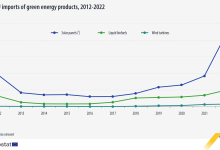Black Gold, Gas and… the Schengen Area
Discussing strictly technically, beyond any evaluation of the performance of the political class from Dambovita County, on December 8, 2022, within the Council of Justice and Internal Affairs of the EU member states, Austria and the Netherlands (they opposed the entry of Bulgaria, a state that would have joined only together with Romania) expressed their vote against Romania’s accession to the community “without borders” within the European Union.
What is the Schengen Area?
The Schengen area, the largest area of free movement in the world, currently includes 26 countries within the European continent, with a total area of approximately 4 million km2 and a population of approximately 420 million people.
Facilitating the movement of people/goods between member states implies a more efficient allocation of resources within the EU with a positive impact on economies and labour markets. It also allows increasing productivity, by relocating investments and industries from locations with low productivity to those with high productivity.
Specifically, from Romania’s perspective, this would be a favourable factor because the local labour force market is still a cheap one. Additionally, the competitiveness of Romanian companies could increase through an easy and quick presence on international markets.
The vote for the Schengen area?
Because Austria announced its disagreement regarding Romania’s accession to the Schengen area only a short time before the voting day, it can be deduced that the decision would be a political one and a purely technical one.
Reporting the Austrians’ recent decision to the Romanian energy sector, a first aspect to analyse is the Offshore Law, adopted in 2018, which led to the blocking of the Neptun Deep project and the departure of the US company ExxonMobil. It was only revised in 2021, after the involvement of Romgaz, the law being amended to create more favourable conditions for investors.
Returning to Austria, it can be said, on a speculative level, that we want better conditions regarding the fees, taxes and royalties imposed by the Romanian state, trying to negotiate them, in the context in which OMV Petrom and Romgaz will make a final investment decision in mid-2023.
Royalties
According to the National Agency for Mineral Resources (NAMR), the royalty for natural gas should be calculated in four steps, as a percentage of the quarterly production value, as follows: 3.5% (less than 10 million cubic meters), 5% (between 10 and 20 million cubic meters), 7% (between 20 and 100 million cubic meters) and 13.5% (over 100 million cubic meters).
For example, it is estimated that the Neptun Deep block would have reserves of approx. 100 billion cubic meters, and it is forecast that between 8 and 9 billion cubic meters will be extracted from the block annually. Thus, OMV Petrom will extract approx. 1 billion cubic meters quarterly and will pay a royalty rate of 13.5%.
It is important to know that from March 1, 2018, royalties for natural gas extracted in Romania are not calculated as a percentage applied to the price at which producers actually sell the extracted gas but applied to the spot trading prices from the previous month on the Central European Gas Hub Vienna (CEGH). And since prices on the Vienna exchange are higher than those in Romania for most part of the year, the state’s policy was an obvious one: to collect more money for the budget.
Taxes and fees
In addition to these royalties, a fee of 10% of the gross income obtained from the transport and transit of oil through the national transport systems and a share of 3% of the value of the gross income obtained from underground natural gas storage operations is charged.
And it doesn’t stop here! In addition to royalties and taxes, the state also charges windfall taxes if the gas is sold at prices higher than RON 85/MWh. Afterwards, the companies also pay a corporate income tax of 16%.
Another element of major importance is the point in the offshore law that specifies that the Romanian state has the pre-emption right for the acquisition of extracted resources. Specifically, the 2 companies will have to offer the resources for sale to the Romanian state first, before proposing the sale to other clients – which is not to the liking of any private company that wants to maximize profits.
In conclusion, according to the calculations made, it is expected that the Romanian state will earn approx. 60% from the exploitation of offshore fields, and OMV Petrom the remaining 40%. From here, you can see a clearer picture of the OMV Petrom situation and the fact that negotiations could intensify in the following months.
Can we get Austria’s vote?
A potential boycott regarding the activity of OMV Petrom has been widely discussed in recent weeks, considering that Austria’s refusal has sparked an emotional wave and general indignation in society. Starting from here, it is natural for us all to ask ourselves, what are the alternatives to purchasing fossil fuels?
Besides OMV Petrom, there are only a few companies that have national coverage, these being Rompetrol, Lukoil, MOL and Socar. Lukoil, along with MOL, are the only companies that purchased oil from Russia in 2022, while Rompetrol and Socar declare that they import crude oil from countries close to the Russian sphere of influence (Kazakhstan and Azerbaijan).
We cannot leave out of the discussion the embargo on Russian oil, which entered into force in December 2022, but also the embargo on Russian refined petroleum products, which will be active starting from February 2023 and will significantly affect Russian refineries and implicitly the European market.
In addition, the excise duties applied to OMV Petrom’s sales represent an important source for the Romanian budget. Almost 50% of the price paid for a litre of gasoline goes to the country’s budget, Petrom being one of the main taxpayers in Romania.
Overcharging producers again
Background: The International Energy Agency (IEA) has estimated that oil and gas producers around the world will have profits of about 4 trillion USD in 2022, double the level of 2021 and about 3 times higher compared to previous years.
Domestic background: Currently, the oil & gas producers in Romania can be counted on exactly 3 fingers of one hand, but we insist on stoically promising Round XI for 13 years. We can’t, we don’t want to, we don’t know or… we have “limited resources” as an official has stated in a recent interview!
Long story short, in the last week of 2022, the Romanian Government adopted a Government Emergency Ordinance (GEO) by which it implements EU Regulation 2022/1854, on overtaxing companies in the oil & gas sector at the European level. This regulation requires the member states to impose a temporary tax of at least 33% applied to the profits of oil and gas companies that exceed by 20% the average of the last 4 years, or to apply equivalent measures.
According to the new GEO adopted by the Romanian Government, companies would have to pay an additional tax of 60% for profits in 2022 and 2023 that exceed by more than 20% the average taxable profits obtained in the last 4 years.
European benchmarking: it is obvious that the practiced “Copy-Paste” policy does not have what it normally seeks and has no foundation. Moreover, 60% is not copy-paste! Each country having the necessary degree of independence to be able to establish its strategy and policy of over-taxation: percentage, year of application etc.
Examples: France, Germany and the Netherlands intend to adopt the 33% tax threshold, according to the EU agreement; for profits starting with 2022.
Austria will impose a surcharge rate of up to 40%, following which companies will have the opportunity to reduce this threshold to 33% if they generate investments in renewable energy.
Italy will impose a surcharge rate of 50% on profits 10% higher than the average of the last 4 years; the Czech Republic approved, in November, a 60% tax on the profits obtained in 2023 by energy companies.
Without strategic objectives and high-performing teams… it’s difficult!
Whether we were predictable in the last 30, 100 or 2000 years is not the purpose of this article. But the message that comes out is that you cannot invite foreign companies to invest in Romania, boast about the increase in direct investments and then look with envy at how they perform and make a profit where you failed to do so!
Romania is on an economic upward trend, and it is natural that the tax system should be adapted to the specifics of each industry. But as long as we remove taxes out of the blue (overnight or at the end of December), we will not have arguments and credibility, even when the intentions are good.
And yet, if the state does not equip its government teams, commissions, and company management with professionals, we will not be able to sit at the table on equal footing with investors in terms of professionalism., we will not be able to ensure a correct common understanding and we will never be credible.
At the end of the day, we could perhaps conclude that access to the Schengen area is not actually about securing the borders…







